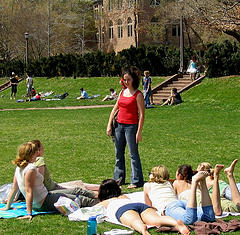The Big Benefits of Small Colleges
As you are trying to figure out what type of college to attend, size should be a part of your consideration. Large universities and small colleges are different in many ways, and either option might work well for you depending on what you’re wanting out of your college experience. It’s really up to you and your interests. Considering that I work at a small liberal arts college, I’m admittedly biased toward the small college experience. Even so, I think it sensible to think about all the benefits that small colleges can offer you. Let’s take a look…

Photo of William and Mary Campus by geopollock
- The Undergraduate Experience: Although large universities might have more academic options, including a greater variety of majors and graduate education opportunities, small colleges tend to focus on the undergraduate experience. By that, I mean that small colleges truly value undergraduate students. While professors conduct research, they are first and foremost committed to teaching. Small colleges are often considered teaching institutions. Without as stringent of a “publish or perish” policy, faculty members at smaller colleges have greater time to adequately prepare for class and to respond to students’ assignments in thoughtful and constructive manners because they are not overwhelmed with conflicting interests and research schedules. At small colleges, the saying would be “teach or perish.”
- Privileged Access to Faculty: Since many small colleges don’t have extensive graduate programs, undergraduate students don’t have to compete with graduate students for faculty members’ time and support. Faculty members, not graduate students or teaching assistants, teach the courses, conduct labs, and hold office hours. As a result, students really get to know their faculty. A former student worker for me at Fort Lewis College recently invited 11 FLC faculty members to her wedding. She had made a conscious effort to get to know her professors. In turn, these individuals became mentors for this student: Two of them helped her land an internship after graduation, and three of them wrote letters of reference for graduate school applications. Without this relationship, undoubtedly she would have had a more difficult time in her graduate school search. Dr. Richard Light encourages students to get to know one faculty member well for each semester they are in college. Students who do so stay academically engaged and have a mentoring network to help them succeed in college and beyond.
- Small Class Size: At a large university, it’s not unheard of to have a class of 500 students, especially during one’s freshmen year. These large sizes can be intimidating and unwelcoming for students. At a small college, that would never be the case. Most small colleges tend to have an average class size of 15-18. Faculty encourage discussion and interaction in their classes and can provide students with quick feedback on assignments. Professors are often available for one-on-one help and students have more direct interaction with their professors than their counterparts have at larger universities. Several studies have been completed over the years that look at class size. Most studies cite 20 students as the breaking point for the learning process. Once the class size extends beyond 20 students, the learning process is hampered. Moreover, large classes tend to have a higher absenteeism rate, and when compared, students in smaller classes show significant learning gains over students in the same course but in a larger section.
- A Sense of Community: At small colleges, it is nearly impossible to get lost in the shuffle. Students, faculty, and administrators know each other on a first name basis. Faculty and staff often eat in the cafeteria with students and faculty members tend to serve as academic advisers, club sponsors, and in some situations, even coaches. There is a genuine sense of community at most small colleges. One of the key tenets for all who work at small colleges is the importance of student support and student interaction. Faculty at small colleges chose to work there because they want to develop meaningful interactions with peers and students and they want to be a direct influence for their students. Small colleges tend to be more collegial. There aren’t as many “empire builders” or hidden agendas and there is less hierarchy, and a greater focus on student success.
So as you are choosing a college or university, think closely about the type of experience you are seeking. If you enjoy getting to know other individuals beyond superficial levels, you want to work closely with professors, you don’t want to be lost in large classes, and you want to be recognized and known by others around you, a small college might be the right choice for you.







